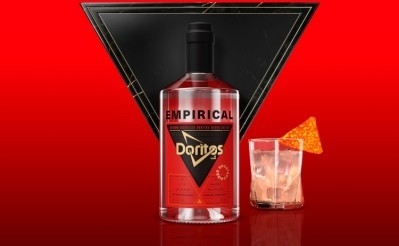More smiles and a brighter future: Frito-Lay expedites pep+ net-zero emissions goal

Paired with advancements in regenerative agriculture, water saving tech and packaging innovation, the move reflects the snacking giant’s progress toward its overarching pep+ goal. The vehicle deployments are expected to lower emissions by 7,052 metric tons of greenhouse gas (GHG) emissions annually.
“Our mission is to create more smiles and a brighter future with every bite,” said Steven Williams, CEO of PepsiCo Foods North America.
“As a collective of America's most beloved brands, we have the unique opportunity to create a real impact by boldly innovating the way food is grown, made and shared.”
Leveraging scale and influence
Frito-Lay is using its beloved brands and its influential place at the table to create positive change for not only the planet, but people and society in general, too, so consumers don’t have to choose between taste and impact.
“Frito-Lay’s beloved brands have made millions of people smile for almost a century,” added David Allen, VP and chief sustainability officer, PepsiCo Foods NA.
“We see it as a great opportunity to ensure our business contributes positively to the world.
“From how our potatoes and corn are grown to how we make, transport and sell our products, Frito-Lay will continue to leverage our scale to create real positive impact for people and our planet.”
+pep action
Frito-Lay is instrumental in the PepsiCo Positive (pep+) strategy, an end-to-end transformation to drive sustainable long-term value and competitive advantage.
As a food company, Frito-Lay is deeply rooted in regenerative agriculture processes that aim to improve soil conditions, reduce carbon emissions, improve watershed health and diversity. The better-for-the earth practices also strengthen farmer livelihoods in service of a more sustainable food system.
In numbers, PepsiCo:
- PepsiCo has a 3.5 million acre farming footprint of agricultural land in the US, with a goal to use regenerative agriculture practices across its entire footprint (7 million acres globally across PepsiCo) by 2030
- The Purchase, NY-headquartered company uses its agricultural supply chain to improve the livelihoods of more than 12,000 US farmers
- The Lay’s, Cheetos and Doritos maker uses 100% sustainably sourced corn and potatoes (1.5 million metric tons) to make its snacks. It also stringently adheres to the social, environmental, and economic principles of its Sustainable Farming Program (SFP).
Better-for-all value chain
Introducing zero-and near-zero emission vehicles across the nation marks a key step in achieving the pep+ net-zero emissions goal by 2040.
“The introduction of electric vehicles throughout our owned fleet and that of our partners is in direct support of our commitment to building a circular and inclusive value chain,” said Laura Maxwell, senior VP of supply chain at PepsiCo Foods NA.
“At our Modesto, California, plant, we have reduced our greenhouse gas emissions by 91% from direct fleet operations, and we look forward to scaling that as we add electric vehicles throughout the country.”
Beyond electric vehicles, Frito-Lay is also making progress towards a sustainable value chain through:
- Improved emissions from zero- and near-zero emission technologies at Frito-Lay’s Modesto manufacturing site
- A new electric fleet to serve the Dallas-Fort Worth area
- First-of-its-kind third-party transportation shipping with Schneider National Inc. This makes Frito-Lay the first to contract transport on Schneider’s fleet of Freightliner eCascadia battery-electric trucks in southern California
- Achieving 100% renewable electricity in all of its US plants, offices and distribution centres
- Recycling 75% of process water at Frito-Lay’s plant in Casa Grande, Arizona.
Positive choices
Sister companies Frito-Lay and The Quaker Oats Company have purposely upped its use of more diverse nutritional ingredients in its products to help consumers make better lifestyle choices. This includes prioritising chickpeas, plant-based proteins and whole grains.
- Bare Snacks: real fruits and coconut
- SunChips Black Bean chips: whole grains and black beans
- Quaker Oats hot cereals: whole grains and a good source of fibre
- Quaker ready-to-eat cereals: Life Cereal, Quaker Simply Granola, Quaker Protein Granola and Quaker Puffed Granola contain between 24g and 46g of whole grains per serving
- Quaker Rice Thins: salted caramel or cocoa smother popped corn and whole grain brown rice with 14g-18g of whole grain per serving.
- PopCorners: air-popped, never fried
- Natuchips: real sliced plantains
- Off The Eaten Path: rice and real veggies like peas, chickpeas or black beans.
Packaging of tomorrow
As a CPG company that’s heavily reliant on packaging, PepsiCo is ensuring that the packaging of tomorrow packs the smallest impact.
Another step along its pep+ journey, Frito-Lay and Quaker together are designing packaging that will be 100% recyclable, compostable, biodegradable or reusable by 2025.
The company recently opened an industry-leading Greenhouse Learning Centre that will test the biodegradation properties of packaging materials in different environments.
















